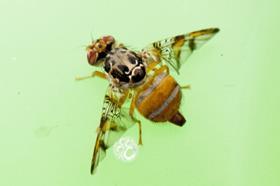
The federal government has announced A$30m of funding to build national resilience to manage fruit fly. The funding, which will be allocated over a period of three years, will look to stop the spread of the invasive pest, drive down pest pressure in vulnerable areas and grow exports.
The ‘Building Resilience to Manage Fruit Fly’ package will see essential upgrades to state-managed roadblocks or quarantine stations to stop the spread of fruit fly, the consolidation and expansion of sterile insect technology capability to drive down pest pressure in vulnerable areas, as well as critical post-harvest treatment infrastructure nationally to grow exports.
Minister for Agriculture and Northern Australia David Littleproud and Minister for Families and Social Services and Women’s Safety, Senator Anne Ruston, said the funding will enable rural and regional communities to fight back against the impacts of fruit fly.
“Fruit fly is a significant pest for our horticultural industries, so we need to tackle the issue from different angles,” Littleproud said. “Australia produces around A$6.5bn worth of crops that fruit fly would love a piece of, so it’s important that we protect our vital horticulture industries.
“We’re looking to stop the spread of fruit fly through regional Australia, while also driving the numbers of fruit flies down. We’ll work together with our state and territory government counterparts to make sure our farmers can get the best out of their crops year in, year out,” he added.
Senator for South Australia Anne Ruston said tackling fruit fly was essential for local exporters to maintain their market advantage.
“It’s vital to get fruit fly off the table as a barrier for local producers and ensure regions like the Adelaide Hills and Riverland can continue to access lucrative export markets,” said Ruston.
“A key component of this is our commitment to build critical post-harvest infrastructure in South Australia to meet immediate needs in response to increasing outbreaks. South Australia is a horticulture powerhouse, and this will help us to continue to punch above our weight into the future.
“We are committed to supporting our growers to achieve their potential and the communities that rely on them,” she added.
This announcement builds on the government’s commitment in 2018 of A$16.9m over four years to strengthen and modernise fruit fly management across Australia.
Fruit Fly eradicated in Port Augusta, South Australia
The Federal funding announcement coincides with news from South Australia that the region of Port Augusta had successfully eradicated Mediterranean fruit fly.
Restrictions on movement of fresh fruit and vegetables in Port Augusta have been lifted after a seven-month battle to rid the horticultural pest.
Minister for Primary Industries and Regional Development, David Basham, said fruit fly maggots were initially discovered in backyard fruit trees and it is pleasing to see the successful eradication.
“Thank you to all residents in the affected area in Port Augusta and surrounds for their support for our fruit fly eradication programme,” said Basham.
“From the first detection in May (2021) where a resident reported maggots to the fruit fly hotline, to residents keeping gardens clean and giving biosecurity access to backyards to apply organic bait, community support has contributed to the successful eradication programme.
“The State Government has been responding to fruit fly outbreaks across South Australia which have been threatening the state’s A$1.3bn at-risk horticultural industry, including 37,500 local jobs, 4,000 businesses and thousands of livelihoods.
“The eradication programme in Port Augusta has been thorough, involving a combination of fruit and vegetable movement restrictions to stop fruit fly spreading, organic baiting, collecting fallen fruit, checking fruit for signs of fruit fly, and releasing sterile flies to break the life cycle,” added Basham.





